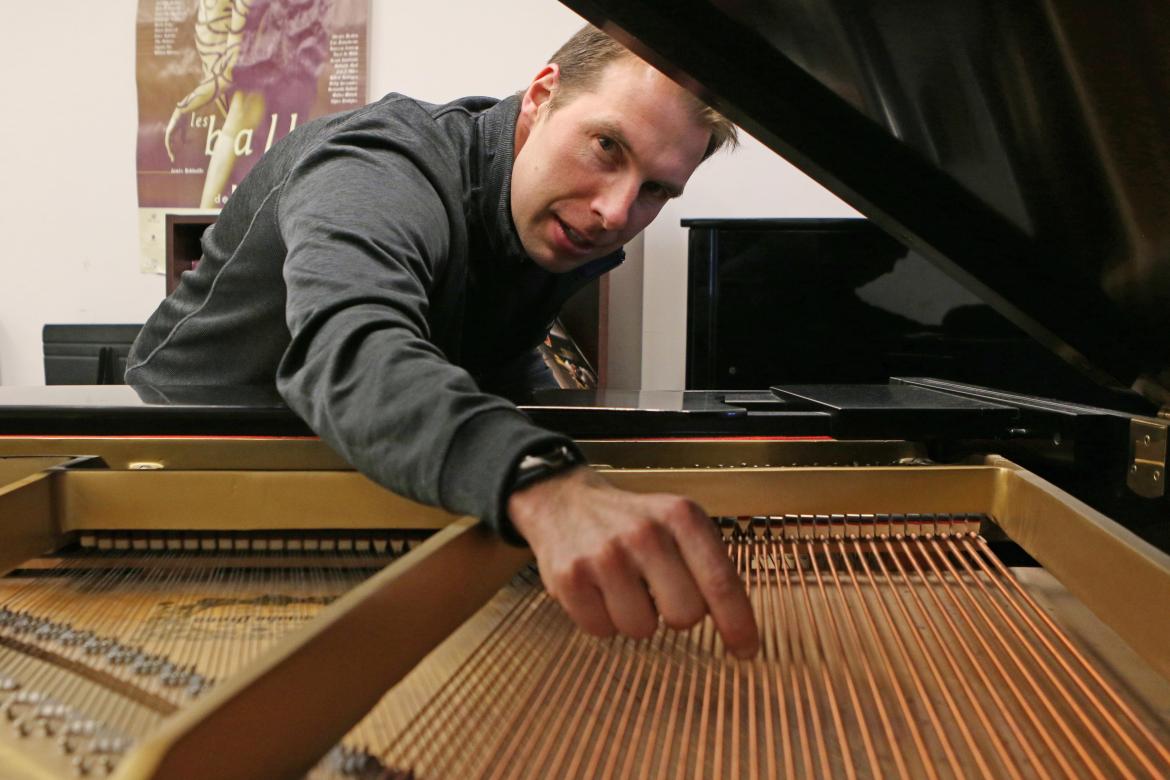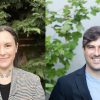
James Mark, Chair of the Music Department, will use musical props such as a piano to explore the concept of perfect pitch during his Colloquium presentation on January 27.
January 16, 2017 - 4:15pm
The University’s Spring 2017 Arts & Humanities Colloquium Series begins January 27 at the Malaspina Theatre
Are you interested in learning something new – for free? The Spring 2017 Arts & Humanities Colloquium Series delivers with three Vancouver Island University (VIU) professors sharing their research and expertise on a range of different topics. This series of free public lectures takes place at VIU’s Malaspina Theatre on January 27, February 17 and March 24, from 10 – 11:30 am.
First up, on January 27, James Mark, Chair of the Music Department, explores the concept of perfect pitch, why musicians find it desirable, and why those who have it sometimes find it unbearable. Perfect pitch, which only about one in 10,000 people have, is the ability to recognize the pitch of a note or produce a given note when it is played, the same way people can identify the colour of an object when they look at it.
Mark, a core member of the Vancouver Island Symphony and the arranger, musical director and violinist for the Yellowpoint Christmas Spectacular, has perfect pitch. He will use demonstrations and personal anecdotes in his presentation to show people the positive and negative elements of having this gift.
“Researchers don’t really know how it is developed, but it means I can tune my violin without any references,” explains Mark. “However, it’s not all it’s cracked up to be. The farther you get into music, the more problematic it becomes for reasons I’ll outline in my presentation.”
Next up in the series, VIU History Professor Dr. Cheryl Warsh delves into the international crisis the thalidomide drug caused in the early 1960s, as told through fan letters to Dr. Frances Oldham Kelsey, a Cobble Hill-born physician and pharmacologist who prevented the drug from entering the American market.
Thalidomide was used as a sleeping pill that was considered safe for pregnant women to use to reduce nausea and vomiting. Later, it was proven to have caused thousands of severe birth deformities in Germany, Great Britain and Canada. Dr. Kelsey was working for the US Food and Drug Administration in 1960 when she received a request to approve thalidomide for use in the United States. Despite strong pressure from the German pharmaceutical company that developed it, and its use in other parts of the world, she stood firm in her opposition and helped avert further an extension of the tragedy that impacted other countries.
For her Colloquium presentation, Dr. Warsh will read excerpts from letters and interviews with Dr. Kelsey (who died in 2015 at age 101) to examine the public’s response to the thalidomide crisis, a response that reveals the public’s Cold war anxieties, including fear of nuclear fallout, radiation poisoning and individual helplessness.
“For about a year after the story broke, Dr. Kelsey was one of the most famous women in the world,” says Dr. Warsh, who plans to write a book on the pharmacologist. “She received thousands of letters at her home and office, letters that tell the other side of the story – how people responded to her and what they were thinking at the time. This was a very significant moment for women in science. It was also the beginning of the health reform movement.”
The final presentation of the Series on March 24 focuses on depicting the unimaginable in film and in books, such as experiences from war zones. Dr. Debra Pentecost, Chair of VIU’s Media Studies Department and a Lecturer in the University of British Columbia’s Sociology Department, looks at innovative ways photojournalists and documentary filmmakers have represented war, conflict and trauma.
Included in her discussion are clips and stills from Ari Folman’s Waltz with Bashir, during which the Israeli film director interviews fellow veterans of the 1982 invasion of Lebanon to reconstruct his own memories of that conflict. The presentation will also cover The Missing Picture, in which director Rithy Panh uses clay figures, archival footage and his narration to re-create the atrocities Cambodia’s Khmer Rouge committed between 1975 and 1979.
“I’ll also be giving people a broader overview of my research, beginning with my PhD dissertation, into how to represent difficult material so that audiences will either listen or watch or read it,” says Dr. Pentecost. “There’s this position, particularly coming out of the Second World War and the challenges entailed in describing the realities and personal experiences of the concentration camps, that both images and words are inadequate to convey what happened, and I’ll explore the limitations of words and images and what some filmmakers and photojournalists have done to navigate those challenges.
The Arts & Humanities Colloquium is a good opportunity for the public to hear what VIU professors are researching and celebrate their scholarly accomplishments. Courtesy parking is available in lot 5D off Fifth Street, and if people wish to drive right up to the Theatre to drop someone off, they can email Katharine.Rollwagen@viu.ca no later than the day before the presentation and she will ensure the gate is open on the morning of the presentation.
For more information about the Colloquium Series, visit the event homepage.
-30-
MEDIA CONTACT:
Jenn McGarrigle, Communications Officer, Vancouver Island University
P: 250.740.6559 | C: 250.619.6860 | E: jenn.mcgarrigle@viu.ca | T: @VIUNews
Tags: Teaching and Learning






